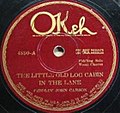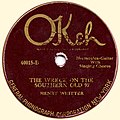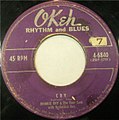Okeh Records
OKeh Records was one of the first influential American independent labels , releasing the first records in 1918 . The label's catalog reflects an essential part of early American blues, old-time and jazz history.
history
Foundation phase
The German-American record manager Otto Karl Erich Heinemann (1877-1965), a brother of Henry Heinemann , headed the US branch of the German record company Odeon Records . During the First World War he came up with the idea of setting up a record company without a German company background. After founding the Otto Heinemann Phonograph Corporation in 1916, along with a recording studio and press shop in New York City , he took care of the acquisition of artists to build up a record catalog. This was originally intended to include pop, dance, and vaudeville styles. Records in German, Polish or Yiddish were also planned. Ralph Peer was initially employed as a talent scout and was able to present the first interpreters in March 1918. From September 1918 the label name OkeH was advertised. Behind this hid the first letters of the label owner Heinemann. While the 10 inch plates were commercially available for 75 US cents, the 12 inch versions were US $ 1.25 each.
In 1919 Heinemann received the necessary capital from the German record company Carl Lindström AG. This also financed a truck in June 1923, which was converted into a mobile recording studio and thus could also record interpreters on site. In 1922 Clarence Williams was hired as musical director to manage the growing number of "Race Records" (that's how Afro-American music was called); Williams also sang for the label himself. Williams was considered the first African-American record manager at a white record label. He succeeded Fred Hager, who had been a producer since the label was founded.
The label's first record was the American national anthem Star Spangled Banner (OKeH # 1001), recorded in April 1918 by the OKeH Military Band . The first marketable records after a few tests came on the market by the tenors Charles Hart and Henry Burr with When The Boys Come Home / The Trumpeter (# 1010) in September 1918. The tenor Billy Murray , who sings full-time for Victor Records , was also part of the catalog, along with half a dozen other tenors. One of the first hit parades for the young label was made by Patrick Conway's band, who recorded the title Tents Of Arabs / Nobody Ever (# 4071) in January 1920 and thus made it to sixth place on the pop charts. A few records later, in May 1920, Billy Murray's cover version of the million- selling Dardanella was released as the B-side of I'll See You In CUBA , an allusion to the beginning Prohibition .
First million seller
When the singer Sophie Tucker did not appear for the scheduled studio appointment on February 11, 1920, Peers Production of the substitute blues singer Mamie Smith caused the first attention in the record industry on August 10, 1920 with the Crazy Blues / It's Right Here For You , because the song composed by Perry Bradford sold 175,000 copies within a few months in the first month after publication in September 1920 and then developed into the young label's first million seller with sales of 1.5 million. Smith paved the way for black blues singers like Billie Holiday or Bessie Smith . In 1921, Mamie Smith became the label's most published performer, with You Can't Keep A Good Man Down / Baby, You Made Me Fall for You (# 4305) (# 4305) , which came out in May 1921, was the best hit parade for the blues singer with a third place -Notice of her career and the label so far. Mamie's style (with the Jazz Hounds , a white band) wasn't exactly blues, but rather “jazz singing” or “vaudeville blues”.
More blues interpreters
The legendary Afro-American pianist and singer Fats Waller began his career on October 21, 1922 with the recording of Muscle Shoal Blues (# 4757) with OKeh, before his breakthrough in 1929 with Victor. Sophie Tucker appeared in the OKeh record studio in February 1922 to record her single High Brown Blues (# 4565), which reached sixth place in the charts. Then on January 5, 1923 , the Louisville Blues was recorded with the old master and composer of the St. Louis Blues , WC Handy . The now famous song about the city on the Mississippi River followed on June 4, 1923 and was launched in August 1923 (# 4896, # 11). On June 23, 1923, King Oliver's band entered the studio to record the first record, the classic Dipper Mouth Blues / Where Did You Stay Last Night? (# 4918), which reached number 9 on the charts. That year, OKeh self-confidently advertised with the slogan “The world's best race artists on the world's largest race label”.
In November 1923 the legendary blues pianist Jelly Roll Morton's first record, Someday Sweetheart , was released under # 8105 , but it was not until 1927 that Victor became famous. Benny Moten's jazz band began here on November 29, 1924 with the Tulsa Blues (# 8184), and the influential blues guitarist Lonnie Johnson began his career in the same year with Mr. Johnson's Blues (recorded on November 4, 1925, # 8253). The legendary Louis Armstrong made his first records with his own band - and not as a member of other orchestras - with OKeh. On November 12, 1925, Armstrong played Gut Bucket Blues / Yes! Together with his backing band His Hot Five . I Am In The Barrel (# 8261), published December 1925. His Muskrat Ramble (# 8300), recorded on February 26, 1926 and published in March 1926, reached eighth place in the charts. Duke Ellington came from Victor before he recorded one of his few singles for OKeh in 1927, Black and Tan Fantasy / What Can A Poor Fella Do (recorded November 3, 1927, # 40955). In February 1927, Alexander's Ragtime Band was published in the version by Miff Mole (January 26, 1927, # 40758), in October 1927 Bix Beiderbecke published his famous In A Mist (September 9, 1927, # 40916), which reached # 20 in the charts could. On December 28, 1928, Mississippi John Hurt came into the studio and presented the Stack O'Lee Blues (February 1929, # 8654), in April 1934 the Mississippi Sheiks brought out the original of the Blues standard Sitting on the Top of the World (recorded on February 17, 1930, # 8784). October 1934 is the month of publication of the Blue Minor (July 6, 1935, # 41572), the first record by drummer Chick Webb's band that would become one of the most sought-after jazz bands of the 1930s. Big Bill Broonzy released his classic I'm Gonna Move to the Outskirts of Town (March 6, 1942, # 6651) in April 1942 .
Old-time hits
OKeh wrote record history with what was probably the first recorded song by a rural musician, Little Old Log Cabin in the Lane / The Old Hen Cackled , published in July 1923. According to overwhelming opinion, the title was directed by Ralph Peer in an empty house in Atlanta was recorded on June 14, 1923 with the OKeh mobile recording studio as OKeh # 4890 with Fiddlin 'John Carson . At the same session in Atlanta, Peer also recorded blues vocalist Fannie Mae Goosby ( Grievous Blues , Okeh 8079). On 7./8. In November 1923, Carson recorded You'll Never Miss Your Mother Till She's Gone / Papa's Billy Goat (# 4994) - this time in New York - which sold over a million copies when released in January 1924. Carson remained loyal to the OKeh label the longest of all performers, namely until October 31, 1931. Henry Whitter , who wrote his self-written piece The Wreck of the Old '97 , which is about a railway tragedy , in December 1923 , along with eight other titles at OKeh recorded a classic with it. The title (# 40015) reached position 12 on the charts.
Even if country music is often spoken of, it is actually old-time music, a style of folk music that was mainly played by the rural population of the Appalachians and is considered to be the basis of today's country music. With the commercialization of this music, previously ignored by the other record labels, OKeh created a basis for the development of other genres, such as country. However, it must also be mentioned that OKeh was not - contrary to popular belief - the first label to release old-time music. The music industry began with Columbia Records in 1916 with the fiddler Don Richardson and his "Arkansaw Traveler". Victor, on the other hand, came with the Fiddler Eck Robertson in March 1923 only a few months earlier.
The repertoire in this genre was expanded so much that OKeh began in October 1925 to introduce its own cataloging, which the record company calls "Old-Time Tunes". and was supplemented again in January 1928. In March 1937, country mentor Roy Acuff was discovered with the Steel Guitar Chimes / Steel Guitar Blues (# 04376) , and on April 25, 1940, steel guitarist Ted Daffan, one of the most important old-time composers, recorded his first songs for OKeh . His first single was I'm A Fool To Care / Put Your Little Arms Around Me from June 1940 (# 5573), his biggest hit was the million-seller Born To Lose / No Letter Today from October 1943. Bob Wills brought two number 1s Hits out, namely Smoke On The Water / Hang Your Head In Shame in February 1945 and Stars And Stripes On Iwo Jima / You Don't Care What Happens To Me in May 1945.
More hits
OKeh also started the career of the hard of hearing Johnnie Ray with Cry / The Little White Cloud (recorded October 16, 1951, # 6840). The record, produced by Mitch Miller , hit the charts in November 1951, sold over 2 million copies and was at number 1 for 11 weeks. Ray then immediately switched to parent company Columbia. Rhythm and blues singer and author Chuck Willis hits the R&B charts at OKeh ( My Story , # 2 was the biggest hit), and his July 1954 I Feel So Bad (# 7029) was later taken over by Elvis Presley . Blues shouter Screaming Jay Hawkins brought out his own composition I Put A Spell on You / Little Demon (recorded on September 12, 1956, # 7072) in November 1956 , which formed the basis for many later cover versions (Animals, in particular Alan Price Set ) . With Major Lance a talented soul singer enters the Studios on September 14, 1962, playing his first single Delilah / Everytime (# 7168) a. With the track Monkey Time (# 7175) recorded on August 5, 1963, OKeh successfully participated in the expiring wave of fashion dance in July 1963 and was able to place the song as number two on the R&B charts (rank 8 pop). The song was penned by Curtis Mayfield , who was a producer and composer for OKeh at the time. The producer was Carl Davis, who had been with the label since 1963, but had to leave the label at the end of 1965 when Epic Records became the new owner. Billy Butler & Chanters achieved the final big success for the OKeh label in June 1965 with I Can't Work No Longer and a sixth place in the R&B charts.
Little Richard recorded two albums for OKeh from 1966, namely The Explosive Little Richard in October 1966, which was released in January 1967, and the LP Little Richard's Greatest Hits - Recorded Live! (recorded on January 25, 1967), released in July 1967. The first album was a flop despite the high-profile cast (Johnny "Guitar" Watson, Larry Williams, Eddie Fletcher and Glen Willings), the second LP with studio live character only reached # 183 on the LP charts. No notice was taken of the five Little Richard singles published between 1966 and 1967. Until 1970 singles were released unsuccessfully under the OKeh label, the last one was released by the Cheers under catalog no. # 7338.
Frequent changes of ownership
On November 11, 1926, the major label Columbia Records acquired the majority of OKeh also because of the excellent studios in New York. Shortly thereafter, producer Ralph Peer left the label and went to Victor. Replacement was in February 1927 Tom Rockwell, who u. a. was responsible for Louis Armstrong. From mid-1933 only Columbia recordings were marketed at OKeh, the bankruptcy of Columbia in November 1933 brought OKeh briefly into the possession of the American Record Company ("ARC Records"), but was discontinued in 1935. When CBS reactivated the Columbia label in 1940, OKeh was allowed to market the Vocalion catalog with many blues and country performers. OKeh remained on the market in this form until 1946. Epic Records took over the label in 1965, then CBS acquired the capital again in 1967, but finally liquidated the now famous label in 1970. The publishing rights of the back catalog belong today to the major label Sony BMG Music Entertainment . At the beginning of 2013, JazzTimes announced that Sony wanted to reactivate the legendary label as part of Sony Masterworks under the motto Global Expressions in Jazz with recordings by Bill Frisell , John Medeski and David Sanborn / Bob James .
Historic record labels
Conclusion
OKeh Records set trends by making African-American singers attractive to white record labels and buyers, helping to popularize country music, and preserving jazz and blues with a large number of performers and titles on records that are now considered classics of these genres . Many songs were undervalued in the hit parade because the label did not have the extensive distribution networks of the major labels available to achieve higher sales levels. That was also the reason why a large number of performers used the label as a stepping stone to achieve success with larger labels. OKeh made some of the boldest entrepreneurial recordings in the early American music industry with some of his performers.
literature
- Ross Laird / Brian Rust, Discography Of OKeh Records 1918-1934 , 2004.
Artist
Okeh published the following artists, among others:
Web links
Individual evidence
- ↑ In 1919, the spelling was in OKeh changed
- ^ AH Lawrence, Duke Ellington And His World: A Biography , 2001, p. 19.
- ^ A b Lawrence W. Levine, Black Culture And Black Conciousness: Afro-American Folk Thought From Slavery To Freedom , 1978, pp. 225 f.
- ↑ David Hatch / Stephen Millward, From blues to rock , 1987, p. 47 with further references
- ↑ ATL 2067 research
- ^ Joseph Murrells, Million Selling Records , 1985, p. 18.
- ↑ Thomas Turino, Music as Social Life: The Politics of Participation , 2008, p. 163.
- ↑ Tony Russell / Bob Pinson, Country Music Records: A Discography 1921-1942 , 2004, p. 22.
- ↑ James Lincoln Collier, Louis Armstrong: An American Genius , 1985, p. 179.
- ↑ Ross Laird / Brian Rust, Discography Of OKeh Records 1918-1934 , 2004, p. 8.
- ↑ Jeff Tamarkin: Sony Classical to Relaunch OKeh Records as Jazz Label - First releases will include Bill Frisell, John Medeski, and David Sanborn & Bob James in JazzTimes 2013
- ^ Charlie Gillett, The Sound of the City, 1996, p. 58.











